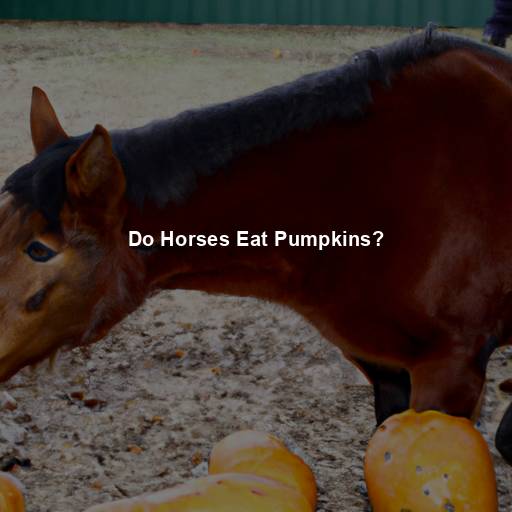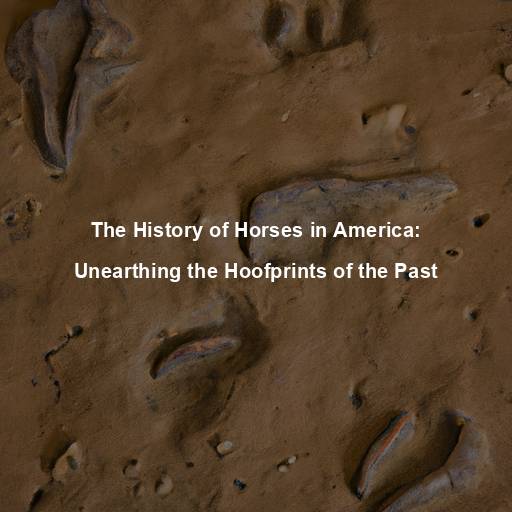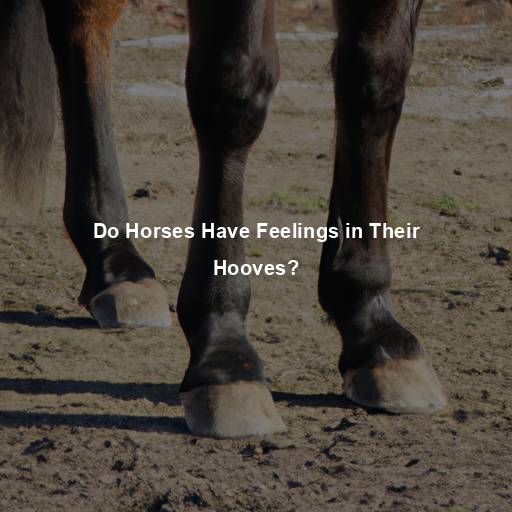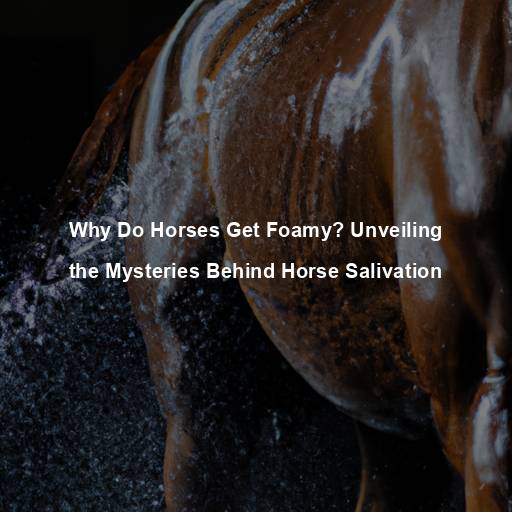Do Horses Eat Pumpkins?
Last Updated on July 31, 2023 by Evan
Contents
- 1 Exploring the Relationship Between Horses and Pumpkins
- 1.1 Unraveling the Curiosity: Can Horses Consume Pumpkins?
- 1.2 Understanding Equine Diet: What Do Horses Normally Eat?
- 1.3 Pumpkins: A Nutritional Powerhouse?
- 1.4 Yes, Horses Can Eat Pumpkins!
- 1.5 Moderation is Key: Don’t Overdo It!
- 1.6 Ensuring Safety: Preparing Pumpkins for Horses
- 1.7 Potential Benefits of Feeding Pumpkins to Horses
- 1.8 Proceed with Caution: Potential Risks and Considerations
- 1.9 Consulting with Your Veterinarian
- 1.10 Sugar Pumpkins: A Sweet Delight
- 1.11 Winter Squash: Nutrient-Rich and Flavorful
- 1.12 Kabocha Squash: A Digestive Aid
- 1.13 Safe Alternatives: Pumpkin-Based Horse Treats
- 2 Pumpkin Carving: Can Horses Enjoy Jack-o’-Lanterns?
- 3 Pumpkins Beyond the Plate: Other Uses and Benefits for Horses
- 4 In the Spirit of Fall: Exploring Pumpkin Spice Treats for Horses
- 5 Final Thoughts: Embracing the Seasonal Joy with Horses and Pumpkins
- 6 FAQs – Do Horses Eat Pumpkins?
- 6.1 Can horses eat pumpkins?
- 6.2 Are pumpkins nutritious for horses?
- 6.3 How should pumpkins be prepared for horses?
- 6.4 Can horses eat the seeds and skin of pumpkins?
- 6.5 How much pumpkin should horses eat?
- 6.6 Are there any risks associated with feeding pumpkins to horses?
- 6.7 Can all horses eat pumpkins?
- 6.8 What are some creative ways to offer pumpkins to horses?
- 6.9 Can pumpkins help with horse digestion?
- 6.10 Are there any specific pumpkin varieties that are better for horses?
Exploring the Relationship Between Horses and Pumpkins
Unraveling the Curiosity: Can Horses Consume Pumpkins?
As autumn approaches, pumpkins start to steal the spotlight with their vibrant colors and delicious flavors. But have you ever wondered if horses can join in on the pumpkin craze? In this article, we will delve into the fascinating world of equine nutrition to determine whether horses can safely eat pumpkins and the potential benefits or risks associated with this unique dietary addition. So, saddle up and let’s explore the relationship between horses and pumpkins!
Understanding Equine Diet: What Do Horses Normally Eat?
Before we dive into whether horses can consume pumpkins, it’s essential to understand the typical equine diet. Horses are herbivores and have evolved to thrive on a diet primarily consisting of forage, such as grass and hay. Their digestive system is specifically designed to process fibrous plant material efficiently. Therefore, a significant portion of their diet should be high-quality hay or pasture.
Pumpkins: A Nutritional Powerhouse?
As autumn rolls in with its vibrant colors, pumpkins rise to the occasion, captivating our senses and evoking a sense of wonder. Beyond their aesthetic appeal, these round wonders hold within them a bountiful array of nutrients, nourishing our bodies from within. However, as curious minds ponder the extent of their potency, an enigma emerges – can these nutritional riches be shared with our equine companions, the graceful horses that gallop alongside us in the journey of life?
Yes, Horses Can Eat Pumpkins!
If you’ve ever wondered whether horses and pumpkins make a compatible duo, we have great news for you – they do! It turns out that many horse enthusiasts have embraced the pumpkin trend and introduced it to their equine pals as a delightful seasonal indulgence. However, before hopping on the pumpkin bandwagon, it’s crucial to navigate through some crucial points to protect the health and happiness of your trusty, four-legged companion.
Moderation is Key: Don’t Overdo It!
While pumpkins can be a healthy addition to a horse’s diet, it’s crucial to remember that moderation is key. Horses should consume pumpkins in limited quantities, as excessive amounts can lead to digestive upset or imbalances. Introducing small pieces of pumpkin or incorporating it into their regular feed routine is a safe approach.
Ensuring Safety: Preparing Pumpkins for Horses
When it comes to treating our beloved horses with pumpkins, it’s pivotal to prioritize their well-being through careful measures. Safeguarding these majestic creatures begins with understanding how to prepare pumpkins specifically tailored for their consumption. By following these insightful guidelines, we can provide our equine friends with a nourishing and delightful experience, free from any potential risks.
When it comes to picking the perfect pumpkins, there’s a little more to it than meets the eye. The journey to finding the one that’s just right is filled with twists and turns. Look for pumpkins that exude freshness, ripeness, and a flawless exterior, steering clear of any hint of mold or imperfections. Don’t be swayed by ornamental pumpkins, as they may have undergone a chemical makeover with pesticides or decorative paints.
When it comes to treating our equine companions to a pumpkin feast, one must exercise utmost caution. Prior to serving, it is imperative to meticulously rid the orange gourd of its tiny seeds and formidable rinds. These seemingly innocuous components can wield treacherous consequences if consumed by our majestic creatures, as the seeds possess the potential to obstruct delicate passageways while the resilient rinds can thwart the horse’s intricate digestive system.
- Cut Into Small Pieces: Cut the pumpkin into small, manageable pieces to make it easier for horses to chew and digest. Large chunks may be difficult for them to consume comfortably.
Potential Benefits of Feeding Pumpkins to Horses
As the autumn season unfolds, it’s time to unveil a fascinating revelation about our equine friends – horses can indeed enjoy the succulent goodness of pumpkins without any harm befalling them. But what could this newfound revelation mean for our equine companions? Brace yourself for a whirlwind of possibilities as we delve into the potential benefits that incorporating this seasonal delight into their diets may bring. Prepare to be fascinated, perplexed, and amazed as we unravel the mysteries surrounding this unexpected equine dietary addition.
Stay ahead of the hydration game by introducing pumpkins to your horse’s diet. These watery wonders are the perfect solution to keep your equine friend well-hydrated, especially during arid seasons or for those horses who need a gentle nudge to sip their ##O. Embrace the power of pumpkins and let your horse quench its thirst with mother nature’s hydrating gift.
Pumpkins, a remarkable source of wholesome goodness, hold a secret treasure trove of dietary fiber, lending a helping hoof to our noble equine companions. This magical fiber, natures gentle guide, plays a vital role in maintaining a harmonious digestive symphony for horses. Remarkably, fiber orchestrates a rhythmic dance within the depths of the equine gut, ensuring seamless bowel movements and fostering a sanctuary of flourishing gut health.
- Vitamin Boost: Pumpkins are rich in vitamins, including vitamin A and vitamin C. These vitamins play essential roles in immune function, vision, and overall well-being.
Proceed with Caution: Potential Risks and Considerations
When it comes to including pumpkins in a horse’s diet, there are some potential pros and cons that must be considered. While pumpkins can provide certain benefits, such as added fiber and hydration, it is important to be mindful of the potential risks involved. Factors like the horse’s overall diet, individual health conditions, and the way the pumpkin is prepared or consumed can all contribute to the perplexing puzzle of whether or not it is a suitable addition to their menu. Consulting with a veterinarian and taking into account the horse’s specific needs and circumstances will help unravel the complexities and make an informed decision.
- Digestive Upset: Horses with sensitive digestive systems may experience mild digestive upset if introduced to pumpkins too quickly or in large quantities. Always monitor your horse’s response and make adjustments as necessary.
When it comes to weight management, pumpkins can be a bit tricky. While they may seem like a harmless treat, excessive feeding can lead to unwanted weight gain for your horse. It’s important to carefully consider your horse’s dietary needs and weight management goals before incorporating pumpkins into their diet. Keep a watchful eye on portion control to maintain a balanced and healthy approach to their nutrition plan.
Consulting with Your Veterinarian
As with any dietary changes or additions, it’s always a good idea to consult with your veterinarian before feeding pumpkins to your horse. They can provide personalized advice based on your horse’s specific needs, taking into account any pre-existing health conditions or dietary restrictions.
Sugar Pumpkins: A Sweet Delight
Did you know that sugar pumpkins, which are also called pie pumpkins, are actually smaller in size compared to other varieties? And not only that, they also have a sweeter flavor that is simply irresistible. It’s no wonder that horses find these pumpkins to be a delightful treat with their natural sugars. Whether you have a picky eater or just want to reward your equine companion during training sessions, sugar pumpkins are the perfect choice to add a burst of sweetness and perplexity to their diet.
Winter Squash: Nutrient-Rich and Flavorful
When it comes to exploring winter squash varieties, such as butternut or acorn squash, it’s fascinating to discover their intriguing connection with pumpkins, making them an unexpected horse-friendly choice. Amidst their vibrant hues and peculiar shapes, these nutrient powerhouses offer a tantalizing blend of vitamins A and C, potassium, and fiber, presenting an intriguing departure from the traditional pumpkin palate, ultimately offering an extraordinary gustatory adventure for your noble equine pal.
Kabocha Squash: A Digestive Aid
Delve into the intriguing world of equine nutrition and discover an unexpected gem – Kabocha squash, a culinary treasure often referred to as Japanese pumpkin. This enigmatic squash variety not only tantalizes the taste buds with its sweet, nutty flavor and vibrant orange flesh but also possesses a hidden gift for our graceful companions. Packed with fiber, this humble vegetable presents itself as a remarkable aid to bolstering horses’ digestive well-being, ensuring smooth bowel movements and safeguarding against potential digestive ailments.
Safe Alternatives: Pumpkin-Based Horse Treats
When it comes to seeking out fuss-free options for your beloved equine companion, a delightful surprise awaits. Enter the realm of pumpkin-based equestrian delicacies, meticulously crafted to offer convenience and delectability hand-in-hand. Prepare to have your horse’s taste buds dazzled as pumpkin dances harmoniously with a cornucopia of nourishing components, rendering these treats a sheer joy for the palate. However, tread with caution and be discerning in your choice, for it is paramount to opt for treats tailor-made for horses, crafted with the finest ingredients to ensure nothing but the best for your equine friend.
Pumpkin Carving: Can Horses Enjoy Jack-o’-Lanterns?
With Halloween just around the corner, many of us enjoy carving jack-o’-lanterns to adorn our doorsteps. But what about our equine companions? Can horses safely consume the flesh of carved pumpkins? Let’s find out!
Carved Pumpkins: The Importance of Freshness
When it comes to offering horses a Halloween treat, it’s important to tread carefully. While horses may enjoy indulging in some pumpkin flesh, the key lies in the quality and state of the gourd. Once a pumpkin has been expertly carved, it embarks on a confusing journey towards decomposition, giving rise to a chorus of bacteria and mold. Consequently, feeding horses pumpkins that have succumbed to this perplexing transformation can potentially jeopardize their well-being.
Fresh and Untouched Pumpkins: A Seasonal Treat
Looking to add a dash of autumn delight to your equine pal’s diet? Well, here’s a horsy secret you won’t want to miss! Imagine their delight as they nibble away on the luscious, untainted flesh of a pumpkin, untainted by the relentless elements. Just remember to carve out those pesky seeds and tough rinds before presenting this delectable seasonal treat to your four-legged companion.
Pumpkins Beyond the Plate: Other Uses and Benefits for Horses
Aside from being a potential dietary addition, pumpkins can serve other purposes and provide benefits for horses. Let’s explore some alternative uses and advantages of pumpkins in the equine world:
Enrichment and Mental Stimulation
Did you know that pumpkins can actually be used to enrich the lives of horses and keep them mentally stimulated? It’s true! Whether it’s setting up obstacle courses with pumpkins as challenging obstacles, using them as fun toys during playtime, or incorporating them into treat-dispensing devices, these activities can help ward off boredom and engage your horse’s natural behaviors. So why not give it a try and see how your equine friend reacts to this burst of perplexing pumpkin entertainment?
Natural Deworming Agent
Did you know that pumpkin seeds have a long-standing, somewhat mysterious reputation as a deworming remedy for horses? The scientific community is still unraveling the enigma surrounding their effectiveness against internal parasites. Nevertheless, a handful of horse owners swear by the positive outcomes they’ve witnessed. However, before you sprinkle pumpkin seeds into your equine friend’s diet, it is imperative to seek the advice of a qualified veterinarian to ensure the right dosage and guidance.
Topical Applications
Pumpkins can also be used topically to benefit horses. Some horse owners have used pumpkin pulp as a natural ingredient in homemade skin treatments. The enzymes present in pumpkins can help soothe and moisturize the skin, providing relief for dryness or irritations. However, always perform a patch test before applying any homemade treatments and discontinue use if any adverse reactions occur.
In the Spirit of Fall: Exploring Pumpkin Spice Treats for Horses
As autumn paints the world with warm hues and the tantalizing scent of pumpkin spice wafts through the air, our taste buds yearn for the comforting embrace of this seasonal flavor. Yet, amidst our indulgence, a question nags at us: could horses, majestic creatures of untamed elegance, also savor the allure of pumpkin spice? Embark on this bewildering journey as we unravel the enigma, piecing together fragments of equine preferences and the mysterious dance between flavor and hoof.
Cautious Consideration: The Pumpkin Spice Trend
The enchantment of autumn comes alive with the aromatic embrace of pumpkin spice. A mystical medley, crafted from the delicate dance of cinnamon, nutmeg, ginger, and cloves, that has charmed its way into the hearts of many. While this tantalizing blend may evoke cozy memories, it’s imperative to tread with mindful steps when sharing this delightful concoction with our equine companions. Balancing caution and curiosity, let us explore the depths of this spicy enigma, guiding our steadfast steeds towards a gustatory adventure that is both pleasurable and safe.
Moderation is Key: Pumpkin Spice Treats for Horses
If you’re considering treating your horse to some pumpkin spice-flavored goodies, opt for specially formulated treats made specifically for equines. These treats often utilize natural flavors and controlled amounts of spices to ensure the overall safety and palatability for horses. Remember, moderation is key, and it’s always wise to consult with your veterinarian before introducing new flavors or treats into your horse’s diet.
Final Thoughts: Embracing the Seasonal Joy with Horses and Pumpkins
As the crisp autumn air sets in and the world transforms into a tapestry of vibrant colors, the allure of pumpkins captures our attention. While horses can indeed eat pumpkins and enjoy their nutritional benefits, it’s crucial to approach this seasonal treat with knowledge and care. Remember to feed pumpkins in moderation, prepare them appropriately, and consider consulting with your veterinarian to ensure your horse’s specific dietary needs are met.
So, this fall, as you revel in the wonders of the season, consider sharing the joy of pumpkins with your equine companion. Whether it’s a small piece of fresh pumpkin, a pumpkin-based treat, or an enriching activity, let the bond between you and your horse flourish amidst the splendor of autumn.
FAQs – Do Horses Eat Pumpkins?
Can horses eat pumpkins?
Have you ever wondered if horses could munch down on pumpkins? Well, wonder no more because the answer is yes! Surprisingly enough, pumpkins are actually considered safe and quite agreeable for our equine friends. But don’t go wild and start throwing whole jack-o’-lanterns at them just yet – moderation is key. Too much pumpkin can lead to a tummyache, so it’s best to offer it as an occasional treat rather than a staple in their diet.
Are pumpkins nutritious for horses?
Did you know that pumpkins can be a secret superfood for horses? Packed with a powerhouse of vitamins and minerals like vitamin A, C, potassium, and beta-carotene, these vibrant orange gourds are like a health boost in every bite. While feeding your equine companion pumpkins as treats can be a tantalizing option, experts advise considering their overall diet and seeking guidance from a trusted veterinarian to ensure optimal nutrition and perplexity-free digestion.
How should pumpkins be prepared for horses?
Before feeding pumpkins to horses, remove any decorations, such as paint or varnish, as these can be toxic. It is best to offer plain or cooked pumpkin, without any added sugar or seasonings. Cut the pumpkin into small, manageable pieces, removing the seeds or any tough parts. Always ensure that the pumpkin is fresh and not rotten.
Can horses eat the seeds and skin of pumpkins?
When it comes to horses munching on pumpkins, caution is key. While they can technically nibble on the seeds and skin, it’s advised to err on the side of caution and remove them before serving. The tough, hard-to-digest skin can leave their digestive systems perplexed, and chowing down on excessive amounts of pumpkin seeds may present a choking hazard or potentially lead to obstructions. To keep our equine friends happily bursting with health, it’s best to stick to serving them just the delicious flesh of the pumpkin.
How much pumpkin should horses eat?
When it comes to pumpkin and horses, it’s best to tread lightly on the orange terrain. While it may seem like a tempting treat, experts suggest treating it as a delightful diversion rather than a daily dish. Best served in bite-sized portions, introducing this festive squash should be approached with caution, keeping a keen eye on your equine friend’s reaction. Should any tummy troubles ensue, with symptoms such as unruly digestion or colicky discomfort, halt the pumpkin feast and promptly seek the wise counsel of a veterinarian.
Are there any risks associated with feeding pumpkins to horses?
When it comes to treating our equine companions to a seasonal snack, pumpkin’s definitely a front-runner. But let’s not get too carried away. It’s true that feeding horses pumpkin can be a safe and tasty treat, but let’s not forget that each majestic steed has their own quirks and preferences. Some horses might have sensitive stomachs, while others might have certain dietary restrictions. So, before you start playing pumpkin fairy, ensure that the pumpkin you offer is as fresh as a meadow breeze, squeaky clean, and devoid of any funky mold or unpleasant rot. And if you’re unsure about how your horse will react to this autumnal delight, it’s always wise to seek the advice of a trusty veterinarian, who knows just what’s best for your equine companion.
Can all horses eat pumpkins?
When it comes to our beloved equine friends, dietary choices can be a bit of a perplexing puzzle. While pumpkins can be a tasty treat for most horses, their individual needs and peculiarities add an extra layer of complexity. It’s essential to approach pumpkin consumption with caution, taking into account any potential allergies, dietary restrictions, or underlying health concerns that our hoofed companions might have. Aging horses, those with metabolic woes, or those predisposed to tummy troubles may require some dietary fine-tuning. Before you embark on a pumpkin-filled adventure, it’s always best to consult with a knowledgeable veterinarian who can navigate the labyrinth of equine dietary requirements.
What are some creative ways to offer pumpkins to horses?
Feeding pumpkins to horses can be a fun and enriching experience. Apart from feeding plain pumpkin slices, you can carve out the inside of a small pumpkin and use it as a natural feed bucket or enrichment device. Stuffing the hollowed pumpkin with hay or other horse-approved treats can provide mental stimulation and encourage natural foraging behavior. However, always supervise the horse during such activities to ensure their safety.
Can pumpkins help with horse digestion?
Pumpkins are known to have beneficial effects on digestion due to their high fiber content. The fiber in pumpkins can help regulate gastrointestinal function and promote a healthy digestive system in horses. However, it is essential to maintain a balanced diet and not rely solely on pumpkins for digestive support. If your horse is experiencing digestive issues, consult with a veterinarian to determine the best course of action.
Are there any specific pumpkin varieties that are better for horses?
When it comes to feeding pumpkins to your horses, there’s no need to get tangled in the vine of specific varieties. As long as the pumpkin is free from additives and as fresh as a crisp autumn breeze, any edible variety can satisfy your equine companions’ taste buds. Pondering the perplexity of pumpkin possibilities, you can unleash your culinary creativity and introduce different types to your horse’s treat repertoire. Remember, though, it’s best to approach these tantalizing experiments with caution, introducing new foods to your noble steed’s diet gradually and keeping a keen eye on their reactions. After all, even our equine friends appreciate a dash of mystery and a pinch of unpredictability in their treats.







